

Multitasking while studying: Divided attention and technological gadgets impair learning and memory. Photo by Louisa Goulimaki/AFP/Getty Images.
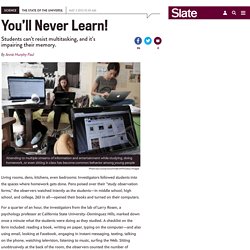
How Does Multitasking Change the Way Kids Learn? Multitasking and Task Switching in the BCA Lab. Back to Projects Page | Back to Main Page In today's information-rich society, people frequently attempt to perform many tasks at once.
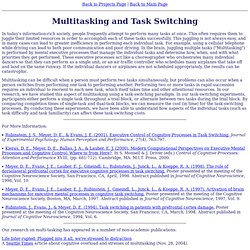
This often requires them to juggle their limited resources in order to accomplish each of these tasks successfully. This juggling is not always easy, and in many cases can lead to greater inefficiency in performing each individual task. Motivated Multitasking: How the Brain Keeps Tabs on Two Tasks at Once. The human brain is considered to be pretty quick, but it lacks many of qualities of a super-efficient computer.
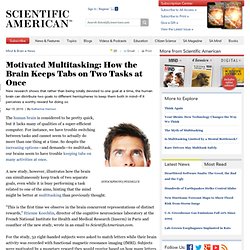
For instance, we have trouble switching between tasks and cannot seem to actually do more than one thing at a time. So despite the increasing options—and demands—to multitask, our brains seem to have trouble keeping tabs on many activities at once. A new study, however, illustrates how the brain can simultaneously keep track of two separate goals, even while it is busy performing a task related to one of the aims, hinting that the mind might be better at multitasking than previously thought.
"This is the first time we observe in the brain concurrent representations of distinct rewards," Etienne Koechlin, director of the cognitive neuroscience laboratory at the French National Institute for Health and Medical Research (Inserm) in Paris and coauthor of the new study, wrote in an email to ScientificAmerican.com. Multi-tasking adversely affects brain's learning, UCLA psychologists report.
Public release date: 26-Jul-2006 [ Print | E-mail Share ] [ Close Window ] Contact: Stuart Wolpertswolpert@support.ucla.edu 310-206-0511University of California - Los Angeles Multi-tasking affects the brain's learning systems, and as a result, we do not learn as well when we are distracted, UCLA psychologists report this week in the online edition of Proceedings of the National Academy of Sciences.

"Multi-tasking adversely affects how you learn," said Russell Poldrack, UCLA associate professor of psychology and co-author of the study. "Even if you learn while multi-tasking, that learning is less flexible and more specialized, so you cannot retrieve the information as easily. "The best thing you can do to improve your memory is to pay attention to the things you want to remember," Poldrack added.
How (and Why) to Stop Multitasking - Peter Bregman. During a conference call with the executive committee of a nonprofit board on which I sit, I decided to send an email to a client.

I know, I know. You’d think I’d have learned. Last week I wrote about the dangers of using a cell phone while driving. Multitasking is dangerous. And so I proposed a way to stop. But when I sent that email, I wasn’t in a car. Well, I sent the client the message. I swear I wasn’t smoking anything. Doing several things at once is a trick we play on ourselves, thinking we’re getting more done. Multitasking hurts brain's ability to focus, scientists say. Originally published June 6, 2010 at 9:18 PM | Page modified June 6, 2010 at 9:23 PM SAN FRANCISCO — When one of the most important e-mail messages of his life landed in his in-box a few years ago, Kord Campbell overlooked it.

Not just for a day or two, but 12 days. He finally saw it while sifting through old messages: A big company wanted to buy his Internet start-up. The message had slipped by him amid an electronic flood: two computer screens alive with e-mail, instant messages, online chats, a Web browser and the computer code he was writing. While he managed to salvage the $1.3 million deal after apologizing to his suitor, Campbell continues to struggle with the effects of the deluge of data. Scholars Turn Their Attention to Attention - The Chronicle Review. Imagine that driving across town, you've fallen into a reverie, meditating on lost loves or calculating your next tax payments.
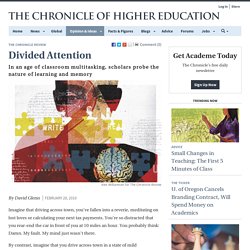
You're so distracted that you rear-end the car in front of you at 10 miles an hour. You probably think: Damn. My fault. My mind just wasn't there. Is Multitasking More Efficient? Shifting Mental Gears Costs Time, Especially When Shifting To Less Familiar Tasks. WASHINGTON - New scientific studies reveal the hidden costs of multitasking, key findings as technology increasingly tempts people to do more than one thing (and increasingly, more than one complicated thing) at a time.

Joshua Rubinstein, Ph.D., of the Federal Aviation Administration, and David Meyer, Ph.D., and Jeffrey Evans, Ph.D., both at the University of Michigan, describe their research in the August issue of the Journal of Experimental Psychology: Human Perception and Performance, published by the American Psychological Association (APA). Whether people toggle between browsing the Web and using other computer programs, talk on cell phones while driving, pilot jumbo jets or monitor air traffic, they're using their "executive control" processes -- the mental CEO -- found to be associated with the brain's prefrontal cortex and other key neural regions such as the parietal cortex. Article: "Executive Control of Cognitive Processes in Task Switching," Joshua S. Rubinstein, U.S. Media multitaskers pay mental price, Stanford study shows.
Stanford Report, August 24, 2009 Think you can talk on the phone, send an instant message and read your e-mail all at once?
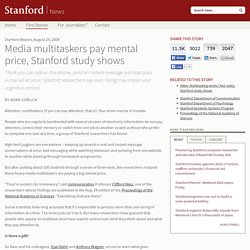
Stanford researchers say even trying may impair your cognitive control. By Adam Gorlick Attention, multitaskers (if you can pay attention, that is): Your brain may be in trouble.